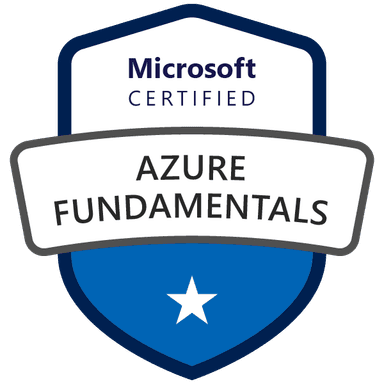AZ-900 Microsoft Azure Fundamentals Exam
Start here! Get your feet wet with the Microsoft cloud and begin your journey to earning your Microsoft Certified: Azure Fundamentals certification!
Practice Test
Fundamental
Practice Test
Fundamental
Describe cloud concepts
Describe cloud concepts
Cloud Computing Basics
Cloud computing is a way of using computer resources, like servers and storage, over the internet. Instead of owning and maintaining your own physical hardware, you access these resources from a provider, like Microsoft Azure. This approach offers many benefits, including cost savings, flexibility, and scalability. Cloud services are typically delivered through a network, allowing users to access them from anywhere with an internet connection. This model shifts the responsibility of managing infrastructure from the user to the cloud provider.
The core idea behind cloud computing is to provide on-demand access to computing resources. This means that you can quickly get the resources you need, when you need them, without having to wait for hardware to be purchased and set up. This is particularly useful for businesses that experience fluctuating demands, as they can easily scale their resources up or down as needed. This flexibility is a key advantage of cloud computing.
Cloud computing is not just about accessing resources; it's also about how those resources are managed and delivered. Cloud providers use sophisticated technologies to ensure that resources are available, reliable, and secure. They also handle the maintenance and updates of the underlying infrastructure, freeing up users to focus on their core business activities. This shared responsibility model is a fundamental aspect of cloud computing.
Cloud Deployment Models
There are three main ways to deploy cloud services: public cloud, private cloud, and hybrid cloud. Each model has its own characteristics and is suitable for different types of organizations and workloads. Understanding these models is crucial for choosing the right cloud solution for your needs. The choice of deployment model depends on factors such as security requirements, budget, and the level of control needed.
The public cloud is where services are provided over the internet by a third-party provider, like Azure. These services are available to anyone who wants to use them. The main advantages of the public cloud are its scalability and cost-effectiveness. You only pay for the resources you use, and the provider handles all the maintenance. However, you have less control over the infrastructure and may have to share resources with other users.
A private cloud is a cloud environment that is dedicated to a single organization. It can be hosted on-premises or by a third-party provider. The main advantages of a private cloud are greater control over the infrastructure and enhanced security. However, it is typically more expensive to set up and maintain than a public cloud. A private cloud is often chosen by organizations with strict security or compliance requirements.
The hybrid cloud combines elements of both public and private clouds. This allows organizations to take advantage of the scalability and cost-effectiveness of the public cloud while maintaining control over sensitive data in the private cloud. A hybrid cloud can be complex to manage, but it offers the most flexibility. It is a good option for organizations that need to balance cost, control, and security.
Cloud Service Models
Cloud services are typically categorized into three main models: Infrastructure as a Service (IaaS), Platform as a Service (PaaS), and Software as a Service (SaaS). Each model provides a different level of control and responsibility, allowing organizations to choose the right level of service for their needs. Understanding these models is essential for effectively using cloud resources. The choice of service model depends on the specific requirements of the application or service being deployed.
IaaS provides the basic building blocks of computing infrastructure, such as virtual machines, storage, and networks. With IaaS, you have the most control over the infrastructure, but you are also responsible for managing the operating system, applications, and data. IaaS is often used by organizations that need a high degree of customization and control. It is a good option for those who want to manage their own infrastructure but don't want to invest in physical hardware.
PaaS provides a platform for developing, running, and managing applications. With PaaS, you don't have to worry about managing the underlying infrastructure, such as servers and operating systems. Instead, you can focus on developing and deploying your applications. PaaS is often used by developers who want to quickly build and deploy applications without having to manage the infrastructure. It is a good option for those who want to focus on application development rather than infrastructure management.
SaaS provides ready-to-use applications over the internet. With SaaS, you don't have to worry about managing the infrastructure or the application itself. You simply use the application as a service. SaaS is often used by end-users who need access to specific applications, such as email, CRM, or office productivity tools. It is a good option for those who want to use applications without having to manage them.
Conclusion
In summary, cloud computing offers a flexible and cost-effective way to access computing resources over the internet. Understanding the different deployment models (public, private, and hybrid) and service models (IaaS, PaaS, and SaaS) is crucial for choosing the right cloud solution for your needs. Cloud computing provides many benefits, including scalability, cost savings, and improved performance. By leveraging cloud services, organizations can focus on their core business activities and leave the management of infrastructure to the cloud provider.
Study Guides for Sub-Sections
Infrastructure-as-a-Service (IaaS) is a cloud service model that provides you with the basic building blocks of computing infrastructure over the internet. Think of it as renting t...
Cloud services offer numerous advantages over traditional on-premises infrastructure. One of the primary benefits is cost savings. Instead of investing heavily in hardware, softwar...
Cloud computing is a way of using computer resources, like servers, storage, and software, over the internet. Instead of owning and maintaining physical hardware, you access these resources from a ...